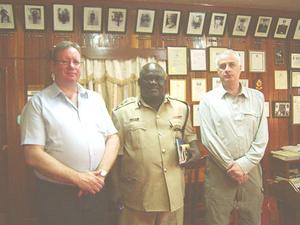 Two consultants engaged in the implementation of the British-funded security sector action plan have arrived here to work with the local police force on crime intelligence, the British High Commission announced yesterday.
Two consultants engaged in the implementation of the British-funded security sector action plan have arrived here to work with the local police force on crime intelligence, the British High Commission announced yesterday.
According to a media statement by the High Commission, Tim Hanley and David Mc William from the Police Service of Northern Ireland are here to work with the Guyana Police Force to help develop crime intelligence, advise on structures, provide training and conduct a needs analysis for the setting up of the new expanded Criminal Intelligence Unit.
While here the security consultants will also look at ways of building capacity in the Police Office of Professional Responsibility. Yesterday the consultants met with Police Commissioner (ag), Henry Greene. Late last year Britain announced that the training of the police anti-crime unit (ACU) in rapid response tactics is one of the measures high on the agenda of the 3 million pounds security reform plan to be implemented this year.
Britain and Guyana signed a Memorandum of Understanding for the implementation of the Action Plan in August last year. Since then there has been a series of meetings involving British experts, representatives of the Guyana Government and local law enforcement agencies to discuss the implementation of the plan. The plan has taken on greater significance in the wake of the two recent massacres and the government is said to have been pushing ahead with it although a parliamentary committee set up to oversee its implementation has never met.
The plan seeks to build the operational capacity of the police force in terms of a uniformed response to serious crime, as well as augment forensics, crime intelligence and traffic policing capabilities.
The plan will also strengthen policymaking across the security sector to make it more transparent, effective and better coordinated. Bringing financial management in the security sector under the umbrella of public sector financial management reform; creating substantial parliamentary and other oversight of the security sector and building greater public participation and inclusiveness on security sector issues are the other components of the plan.
The committee is expected to receive and examine official annual reports from the administration on the status of the implementation of the activities in the 11 priority areas on an annual basis and also to provide a final report to the National Assembly of their examination of the reports on the implementation of the entire action plan.
